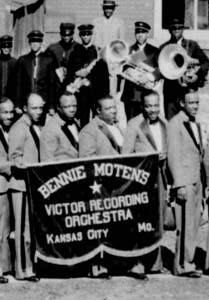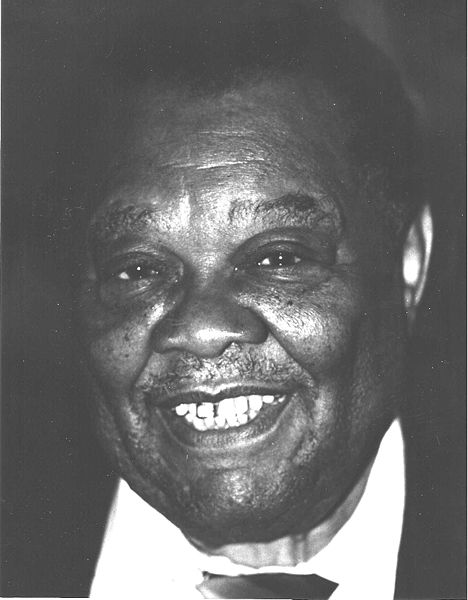
Benny Moten’s Victor Recording Orchestra, Count Basie 2nd from Right, 1930. Photo courtesy Rutgers University, Institute of Jazz Studies
Pianist, vocalist and bandleader Jay McShann was born in 1916 in Muskogee, Oklahoma and came of age musically in the wide-open atmosphere of Kansas City in the 1930s. Under the corrupt domination of ‘boss’ Tom Pendergast, many musicians found work in the downtown Vine Street district where illegal booze flowed freely and the jazz was hot and swinging. The scene in Kansas City pulled jazz musicians and barnstorming ‘territory bands’ from all over the Southwest. Bandleaders had their choice of the best players in the business. The first local band to make it big was Benny Moten’s Orchestra. Ralph Peer, a talent scout for the Okeh label, turned up in Kansas City and recorded Benny Moten’s band in 1923 for what the label called their ‘race’ catalog of black recording artists. This was the first chance the rest of the country had to find out that something big was happening in Kansas City.
In 1935 Benny Moten had an incredible line-up of veteran sidemen he had picked up from the famous Blue Devils band. There was Count Basie on piano, Walter Page on bass, Lester Young and Buster Smith on sax and singer Jimmie Rushing.
When Moten died, Count Basie and Buster Smith kept the group together and formed the Barons of Rhythm. They took over the bandstand at the Reno Club at 12th and Cherry in Kansas City. Every night, the band started playing at 9pm for the first floorshow. They played four floorshows a night, the last show ending at four in the morning. In between sets, the band played for dancing.
Even after that last show in the early hours of the morning, nobody went home. Musicians from other clubs in town poured into the Reno Club for jam sessions. The music could go on for hours. With all the playing and all the monumental talent in town, Kansas City became the greatest jazz workshop of the decade.
Jay McShann found himself in Kansas City in 1936, and after establishing himself there, he started his own band playing "jump" blues, swing and boogie-woogie. Several future stars of jazz worked for him, most notably the great alto saxophonist Charlie Parker. Jay remembers first hearing Parker while standing on a sidewalk outside a K.C. club where Parker was playing. He remarked that Parker's sound was unlike anything he had ever heard. Parker stayed with McShann's band for five years before venturing out on his own in New York.
Though Charlie Parker was part of the first generation of ‘modern jazz’ or ‘bebop’ style of jazz, his playing style always reflected his Kansas City blues roots and his apprenticeship with Jay McShann.

Jay McShann in Edinburgh. Photo by Phil Wright. Used by permission.
On his visit to The Landing for Riverwalk Jazz, Jay McShann performed his best-known songs, "Confessin’ the Blues"(covered by the Rolling Stones),"Jumpin' Blues" and "I'll Catch the Sun." Jay tells stories of his early days, going broke on the road, and then becoming a mainstay of the Kansas City scene. He tells how he got his famous nickname "Hootie," and sings and plays his hilarious composition, “Hootie’s Ignorant Oil.”
Jay McShann continued to perform worldwide at jazz festivals and parties well into the 2000s, on many occasions at the Mid-America Festival in St. Louis opposite The Jim Cullum Jazz Band. He was inducted into the Blues Hall of Fame and was nominated for a Grammy in the Best Traditional Blues category for his 2003 album, Goin’ to Kansas City. Jay McShann died in 2006 in Kansas City at the age of 90.
Photo credit for home page teaser image, Kansas City blues legend Jay McShann. Photo courtesy Clemson University, Billy Vera Collection
Text based on Riverwalk Jazz script by Margaret Moos Pick ©2012

